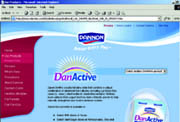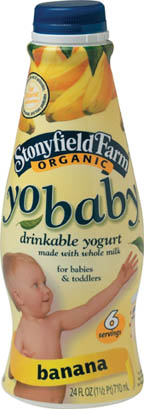
You know you have hit the mainstream when Oprah takes notice of you. In the February 2004 issue of her magazine, O, probiotics received some much-deserved attention in an article titled, “Probiotics: The Next Big Thing?”
The article defined probiotics in layman's terms as “live, 'friendly' bacteria found in food (usually yogurt); also sold as pills or powders that purport to maintain a healthy balance of bacteria, particularly in the gut.” The article went on to recommend its readers obtain probiotics through food, primarily yogurt. “Accumulating evidence backs the benefits of probiotics, and if you can get them through food, all the better. Yogurt supplies about 100 million bacteria per gram: look for labels touting live, active cultures and aim for 100 million and up per dose.”
Although the article does not detail the many potential benefits of probiotics, it does aid food manufacturers in one of their biggest challenges: consumers' lack of knowledge about beneficial bacteria. The benefits, such as improved intestinal health, are well documented. The general consumer, however, is unfamiliar or does not understand the concept of healthy bacteria.
“The U.S. market for probiotics is extremely young, unlike the European market where there is widespread understanding of the immune-boosting and preventative benefits associated with daily yogurt consumption and probiotics,” said Mary Jo Viederman, founder, Living Out Loud Communications (Concord, N.H.), at the recent 2004 Dairy Innovation Forum sponsored by Dairy Management Inc.™ (DMI, Rosemont, Ill.).
In Europe, probiotics are set to triple in sales over the next six years, to reach $137.9 million in 2010. In contrast, the U.S. market is projected to reach $394 million, according to Frost & Sullivan (New York).
Achieving the Perfect Fit
With some long-overdue publicity and growing consumer awareness, the time is right for probiotic offerings in the U.S. And what better way to deliver them than through dairy products? “American consumers are looking for foods that meet a variety of needs—quick, easy, healthful and functional. Dairy foods and probiotics are a perfect fit,” said Viederman.
Viederman suggested that manufacturers adopt a preventative/wellness marketing strategy to grow specialized product categories that offer probiotic benefits. Examples of this approach can be seen in the current positioning of some brand leaders in probiotic-containing products:

The Pros of Probiotics in Dairy
Although yogurt is most commonly associated with probiotics, other dairy products are currently being sold with beneficial bacteria. For example, Lifeway Foods (Morton Grove, Ill.) offers Basics Plus™ Kefir with colostrum and Sweet Kiss[tm] probiotic cheese spread. Basics Plus is a dairy-based dietary supplement beverage that says it combines the health benefits of kefir and colostrum to enhance and supplement the immune system. Horizon Organic Dairy (Longmont, Colo.) offers cottage cheese with Lactobacillus acidophilus and Bifidobacteria bifidus. In Europe and Japan, probiotics are marketed to enhance infant formulas.Probiotic bacteria have a long historical association with dairy products. Some of the same bacteria that are associated with fermented dairy products also make their homes in different sites in the human body, including the mouth, the gastrointestinal tract and the vagina. Some of these microbes, therefore, can play a dual role in transforming milk into a diverse array of fermented dairy products and, through dairy vehicles, contribute to the protective army of colonizing bacteria.
Dairy foods also protect probiotic bacteria. High acid levels in the stomach and high bile concentrations in the small intestine can lead to the demise of many members of the probiotic population. Consumption of probiotics with dairy foods such as milk, yogurt and cheese buffers stomach acid and increases the chance that the bacteria will survive into the intestine.
It also is believed that components in dairy foods can have synergistic effects on probiotics. For example, in vitro studies at the State University of New York (Buffalo) showed that the lactoferrin in dairy products could enhance bifidobacteria growth.
Some yogurts are being formulated to contain prebiotic compounds, which are complex carbohydrates that promote the growth of beneficial probiotic bacteria in the intestinal tract, specifically the Bifidobacterium and Lactobacillus species. Humans cannot digest prebiotics. But recent studies, supported by DMI with funding from America's Dairy Farmers[r], have shown that L. acidophilus bacteria are able to digest these prebiotic compounds and, further, suggest that this ability could give this probiotic bacterium a competitive advantage in the gastrointestinal tract. It is now recognized that adding prebiotic compounds, such as fructo-oligosaccharides, to yogurt can promote the growth of probiotic bacteria in the gastrointestinal tract, helping to promote gut health.
Live active cultures in fermented dairy foods also carry a positive health image, thanks to marketing campaigns of several cultured dairy products. Probiotic bacteria in dairy foods can be an extension of the comfortable association of cultures in dairy products, and make it easier to communicate messages about health to the public.
The healthful properties of probiotics have the potential to blend well with the healthful properties of dairy products. Dairy products long have been associated with building strong bones and more recently, with helping people achieve and maintain a healthy weight. Probiotics can potentially add to dairy's health appeal.
Innovating with Probiotics
Refrigerated, fermented milk, yogurt, cheese and dairy spreads currently deliver probiotics, but there is room for other innovative dairy products. For instance, probiotics could enhance ice cream, frozen yogurts and other frozen novelties.Additional research supported by DMI is under way to provide evidence of health benefits from consuming probiotic cultures in dairy foods, and to define technologies to develop milk-based products that can best act as carriers for probiotic cultures.
Dairy processors and food manufacturers who want to catch the probiotics wave can get help in product formulation, pilot-testing and production scale-up through the dairy research centers and the applications labs supported by Dairy Management Inc. Oprah's readers are waiting.